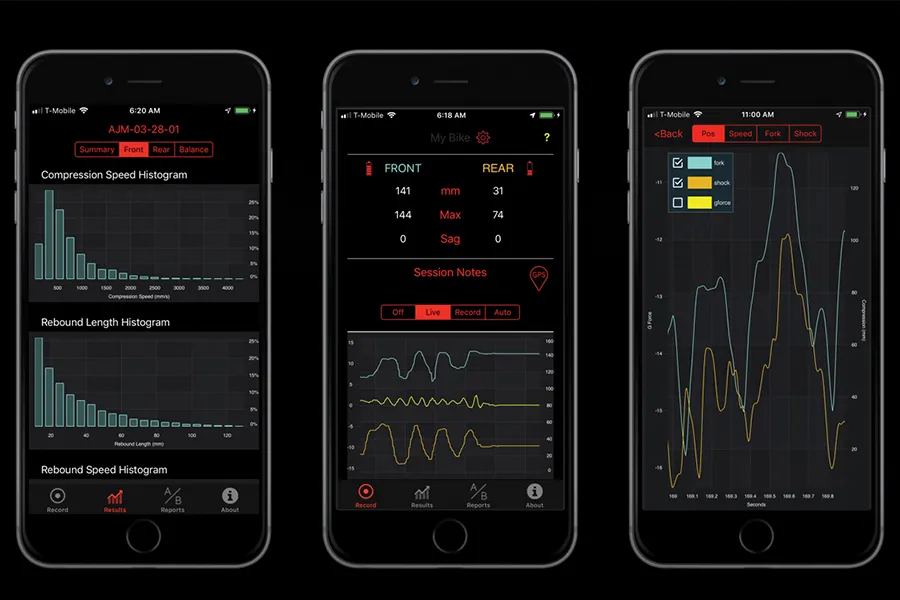Setting up a mountain bike can seem like a real minefield with hundreds of potential ways in which to get it right or wrong.
In fact, according to Motion Instruments founder Rob Przykucki, there are billions of variations in suspension settings alone (think air pressure, compression and rebound adjustments, air tokens, etc.).
That’s why Przykucki and a small team of senior product engineers started Motion Instruments (MI), to create a practical data acquisition system that is available to the masses.
What is data acquisition and why does it matter?
Data acquisition – the practice of gathering feedback and readings – is used in mountain bike development and regularly in downhill racing in order to record the way a bike reacts in various terrain and under changing conditions.
This helps designers and teams in creating or setting up a bike that works optimally in differing circumstances.
However, systems used for data acquisition are typically bulky and derived from motorsports.
Specialized’s downhill world champion Loic Bruni famously and fastidiously prepares his bike for every race with the help of an identical spare bike with a customised, complex system attached, but it doesn’t take an expert to realise this would never be practical for the everyday rider.

What is different about Motion Instruments' system?
Motion Instruments’ system uses wireless connections and simplified components to record suspension action directly to an app on the user’s mobile phone (currently only for iOS, but an Android version is in the making).
That isn’t to say there is no racing prestige behind it. The system has been developed over three years with the likes of downhill’s most successful ever racer, Greg Minnaar, and a number of other top-tier racers in various disciplines.
According to the brand, the mission in developing Motion Instruments was “data acquisition with a smart app that makes things much easier than ever before”, and to capture data “without the burden of a laptop or wireless network” (MI works on a Bluetooth connection).
It gives “bike-, rider- and terrain-specific data” that utilises the bike’s geometry and leverage curve (the app has a growing catalogue of bikes pre-programmed) to show how the “wheels are interacting with the terrain in conjunction with the damper shaft motion”.
Motion Instruments claims that its system is the only one that can quantify the balance of a bike, "comparing front and rear bike-to-ground interaction for compression and rebound movement”.
It adds that it “provides in-depth analysis with a complete break down of fork and shock data with the information laid out clearly, highlighting virtual o-ring watermarks for specific trail events, position and velocity histograms, and terrain-specific analysis”.
If none of that made any sense to you, all it means is “it makes it easy to share and save files using your phone” – Okay, great!

Interpreting data, even when laid out in a clear and quite easy to read manner in the MI app (called MotionIQ), might seem even more daunting than setting the bike up from feel alone.
However, systems such as MI’s will allow even complete technophobes to employ the help of a local bike shop to dial-in a bike much more easily and assuredly. Think of it as bike fitting for mountain bikers.
The system, and others like it, also has the potential take amateur racing to new levels.
Previously available systems were prohibitively expensive, not available for public purchase or would take a lot of use and expertise to grasp. Although it should be noted that Quarq’s Shockwiz is another user-friendly way of garnering data direct to a mobile app that has been around for some time, although it operates differently to MI’s system.

Motion Instruments system pricing and availability
Several Motion Instruments systems are available for downhill, enduro and cross-country bikes, with two levels of kit offered.
The less costly Expert setups have a simplified Fork Tracer component, whereas the Pro level comes with a (slightly) more precise fork and shock sensor (the XC version is for front suspension only).
Additional or replacement components are available via MI’s website.

Through the MotionIQ app, users are able to review a wide range of data and information on rebound and compression, axle position, vibration, bike balance and GPS. Ride records can be integrated into Strava, allowing you to see what was happening and where.
There is also a handlebar-mounted button that allows you to drop a pin onto your ride map so you can make a note of a certain event (e.g. hit a big hole, emergency braked, etc.) and review where that happened on-course.
The MotionIQ app requires any of three tiers of subscription – Free, Expert and Pro – with the paid subs ranging from $9 to $29 per month (annual discounts available).
Each level provides differing levels of insight and analysis as well as how many bike setups can be stored in the app.

Motion Instruments’ pricing is as precise as you’d expect from a data company.
MI is also offering 25 per cent off the RRPs (listed below) for a limited time in its pre-order sale, in a bid to quickly ramp-up its manufacturing. The company intends to ship orders within six to 10 weeks.
- Cross Country Pro: $682.46
- Cross Country Expert: $472.49
- Enduro Pro: $1,312.49
- Enduro Expert: $1,049.99
- Downhill Pro: $1,312.49
- Downhill Expert: $1,102.49
